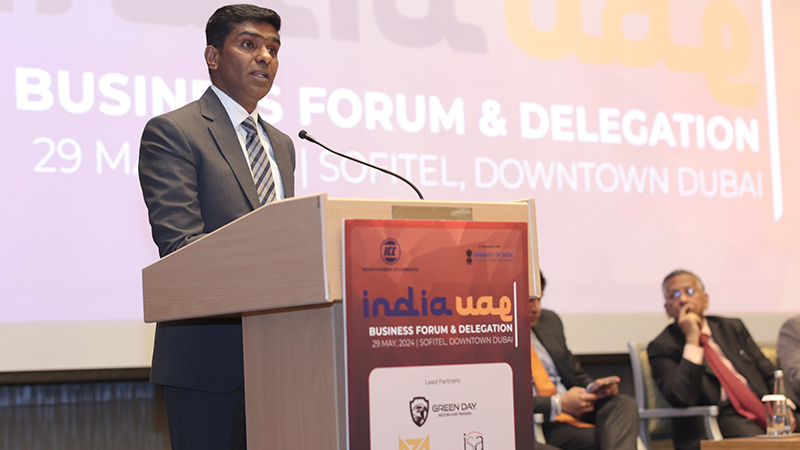Speaking at the India-UAE Business Forum, organized by the Indian Chamber of Commerce (ICC) on 29 May, Satish Kumar Sivan, Consul General of India to Dubai, remarked that the two countries’ economic relationship is “most critical” not just for India or UAE but for the entire region. “Our partnership is not just a bilateral affair, it has the potential to change the destiny of the region… We are on the cusp of a glorious phase of growth in our bilateral relations that will propel the comprehensive economic partnership which has been on an accelerated upward trajectory over the past decade to even greater heights.”
What comes shining through is the spirit of entrepreneurship, which is being advanced actively by both sides. “I believe there can be no better place to discuss fostering entrepreneurship than the UAE, especially in the dynamic city of Dubai,” Mr Sivan said, adding that the UAE creates a conducive ecosystem, nurtured by “not just the government but industry bodies, the finance sector, educational institutions and private sector stakeholders”.
In today’s technology-driven economic setup, encouraging entrepreneurship involves not only supporting start-ups but also promoting a culture of innovation and risk-taking, celebrating success stories, while providing education and mentorship. “In the case of the UAE, the eclectic combination of Indian entrepreneurs who have built fortunes with their vision and perseverance in a conducive, nurturing environment envisioned by the rulers of this great country is what has provided the solid platform on which its economic fortunes rests today.”
Mr Sivan said he’s come across various stories of enterprise of Indian nationals who have placed their faith in “this land of promise” and have emerged triumphant. “The UAE government has, over the years, consistently supported entrepreneurs with their economic policies, access to capital, mentorship, infrastructure and, most importantly, a supportive, regulatory environment.”
The UAE, with its “uncanny ability to reinvent” itself consistently with ideas and products that are trend-setting, has become a global leader in innovation and entrepreneurship leaving the traditional economic hubs far behind. No surprise then that its economic strategies can offer valuable insights on fostering entrepreneurship for India.
One example. “Realising the limited availability of hydrocarbons, the UAE decided to focus on — and expand — a non-oil based economy much earlier than other GCC states, and has become a preferred gateway for global markets. Today, the non-oil sector contributes to 70 per cent of their GDP, with the growth rate of non-oil outperforming the oil sector by several percentage points.” Trade, technology and tourism have become its priority areas.
The unicorns in the region may grow to about 100 by 2030, Mr Sivan pointed out, with Dubai alone expected to host 30 of them; and 40 per cent of venture capital funding in the MENA region comes to the UAE. The country has been proactive enough to launch the Future 100 initiative to support the top 100 start-ups in new economic sectors such as space, renewable energy and emerging technology. “This vibrancy on the UAE side is matched by the dynamism on the Indian side too. India’s start-up ecosystem today is bustling with innovation, ambition and a strong entrepreneurial fervour.”
With an expanding digital infrastructure, business-friendly reforms, government funding and entrepreneurial spirit, India has emerged as the world’s third largest start-up ecosystem with about 113 unicorns, which boast a collective valuation of nearly $350 billion. “India is where bold ideas flourish and dreams take flight,” Mr Sivan noted. Together, India and UAE are looking to take advantage of these synergies that lie in many of the new-age technologies and collaborate on a bilateral basis.
The Comprehensive Economic Partnership Agreement (CEPA) has made provisions for both countries to strengthen collaborations and promoting start-ups, exchange best practices, and promote interactions between accelerators and incubators. Now, “We are collaborating on establishing an India-UAE start-up bridge. DIFC and FICCI Leads, India’s major incubator, have launched their India-UAE start-up corridor… they will identify 50 promising early-stage start-ups from both countries in the next 5 years. A $150-million fund has been launched, that aims to develop at least 10 such start-ups into unicorns in the near future.” (This is an ongoing series from the India-UAE Business Forum, stay tuned in for more updates.) – The writer is Consulting Editor of nrifocus.com


Leave a Reply